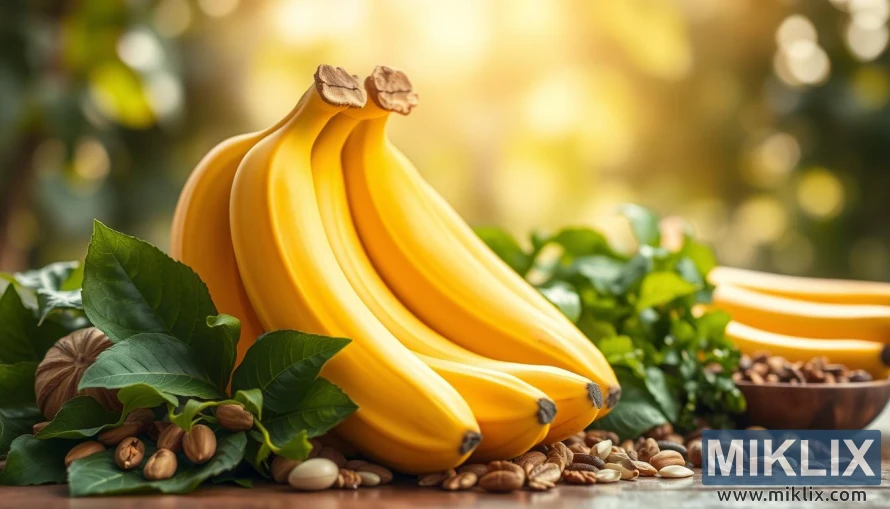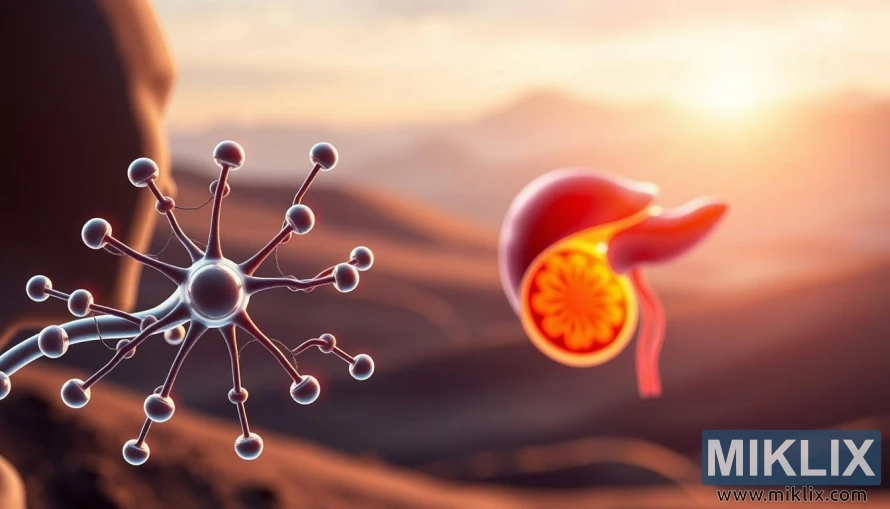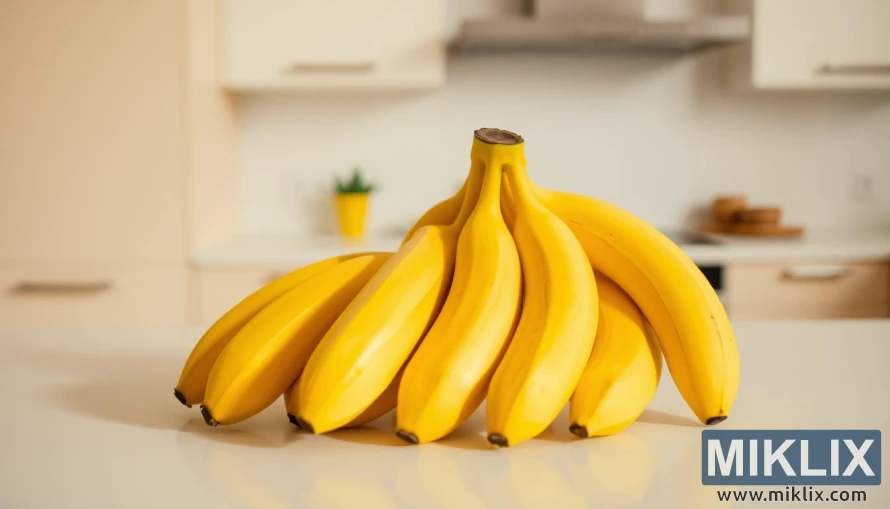From Potassium to Prebiotics: The Banana's Hidden Health Boosters
Published: May 12, 2025 at 7:40:59 PM UTC
Bananas come from Southeast Asia and are loved for their sweet taste and easy-to-carry nature. They are packed with nutrients, making them a key part of a healthy diet. This article will explore how bananas can boost your health and why they're great for your daily meals.

Key Takeaways
- Bananas are nutrient-dense fruits with numerous health advantages.
- They provide a convenient, portable snack option.
- Incorporating bananas into your diet can improve overall wellness.
- These fruits contribute to digestive health and may aid in weight management.
- Bananas are beneficial for heart health due to their rich potassium content.
Introduction to Bananas
Bananas are a favorite fruit globally, with a history in ancient Southeast Asia. They are grown in over 150 countries, making them a common food. Their journey to different cultures shows how much people love them.
Bananas are not just tasty; they're also good for you. They help keep your heart healthy and give you important nutrients. Knowing their history helps us see how valuable they are in our diets.
The health perks of bananas are many. They support heart health and offer vital nutrients. Their history shows their importance worldwide. This makes them a beloved snack in many homes.
Rich Nutritional Profile of Bananas
Bananas are loved for their taste and nutritional value. A medium banana has about 110 calories, making them a great snack choice. They are packed with vitamins and minerals that support our health.
Bananas are full of potassium, giving us about 10% of what we need daily. This mineral helps keep our blood pressure right and our muscles working well. They also have vitamin B6 and vitamin C, which boost our energy and help fight off sickness.
Magnesium in bananas helps our muscles relax and our nerves work right. The fiber in bananas helps our digestion and keeps our gut healthy. With all these nutrients, it's no wonder bananas are a favorite among those who care about their health.
May Improve Blood Sugar Levels
Bananas are getting more attention for helping control blood sugar, which is key for diabetes management. They have a low glycemic index of 47, which means they release glucose slowly. This slow release helps avoid sudden spikes in blood sugar.
Resistant starch in unripe bananas plays a big role in this benefit. It works like soluble fiber to keep blood sugar stable. This makes bananas a good choice for those trying to keep their glucose levels healthy.
Support Digestive Health
Bananas are packed with dietary fiber, which is key for good digestion. The fiber in bananas, like pectin and resistant starch, helps keep your bowels regular. This is great for people who often get constipated.
The fiber in bananas also acts as a prebiotic. This helps the good bacteria in your gut grow. A healthy gut microbiome is vital for good digestion and overall health.
Aid in Weight Loss
Bananas are great for weight loss because they have few calories but lots of fiber. This mix helps you feel full for longer. Eating bananas can help you eat fewer calories because they make you feel satisfied.
There's no single study that says bananas alone lead to weight loss. But, their nutrients are good for managing weight. The natural sugars in bananas are a tasty choice instead of junk food, helping you stick to a healthy diet.
Try bananas in different ways, like:
- On top of oatmeal for a nutritious breakfast
- As a quick and healthy snack on the go
- In smoothies to boost fiber intake
Adding bananas to your day can help with weight loss. They're also delicious and can curb your cravings.
Heart Health Benefits of Bananas
Bananas are tasty and easy to eat, and they're good for your heart. They're full of potassium, which helps keep your blood pressure right. Eating foods high in potassium can lower your risk of heart disease.
Bananas also have magnesium, a mineral that's good for your heart and blood pressure. Adding bananas to your meals can make your heart healthier. They're not just yummy; they're also good for your heart.

Antioxidant-Rich Wonder Fruit
Bananas are packed with antioxidants, like flavonoids and amines. These help fight off chronic diseases by reducing oxidative stress.
Eating bananas regularly can boost your health. They help manage inflammation, which is key to avoiding many health problems.
This tasty fruit does more than just satisfy your sweet tooth. It also supports your long-term health. Adding bananas to your meals can improve your overall well-being and provide vital nutrients.
May Help Increase Satisfaction and Fullness
Bananas are great for those who want to feel full without eating too many calories. They have a lot of fiber, which helps control hunger. Eating bananas, even with protein, makes for a filling snack.
Bananas are low in calories but packed with nutrients. Adding them to your diet can make you feel full. This is good for weight management because of their fiber and natural sweetness.
Promote Improved Insulin Sensitivity
Eating unripe bananas may help with insulin sensitivity, which is key for managing diabetes. These bananas are full of resistant starch, a carb the body can't digest fully. Studies show that resistant starch makes the body better at using insulin, helping control blood sugar.

Adding unripe bananas to your meals can be tasty and healthy. The resistant starch in them may reduce the chance of getting type 2 diabetes. It also boosts your metabolic health.
Potential Kidney Health Benefits
Bananas are packed with potassium, which is great for your kidneys. Potassium helps keep the right balance of fluids, supports muscle function, and aids in nerve health. For those with chronic kidney disease, watching potassium intake is key. Eating bananas and other fruits in moderation can help slow down kidney disease.
It's important to be mindful of potassium levels, more so in later stages of kidney disease. Talking to a healthcare professional can help figure out how much potassium-rich foods like bananas are safe to eat. These tasty fruits are not only good for you but also help protect your kidneys.
Aid in Exercise Performance
Bananas are great for boosting exercise performance. They are full of carbs that are easy to digest. This makes them perfect for athletes and those who love to stay fit.
During hard workouts, muscles need certain nutrients to work well. Bananas have potassium, which is important for muscle function.
When we sweat a lot, we lose important salts. Bananas help replace these salts. This keeps our muscles working well during exercise and helps us recover faster.
Adding bananas to your workout routine can improve your energy and muscle recovery. They are a healthy and easy choice for anyone wanting better workout results.
Convenience and Versatility of Bananas
Bananas are perfect for busy people because they're easy to grab and go. They come in their own natural packaging. This versatile fruit suits many diets, pleasing different tastes.
Bananas are also great for cooking. You can blend them into smoothies or mix them into cereals for extra taste. They're also good in baked goods like banana bread. Their dietary uses show how versatile and appealing they are in daily meals.

Risks of Overconsumption of Bananas
Bananas are a favorite fruit for many, thanks to their health benefits. But eating too many can cause problems. One big issue is too much potassium. This is a concern for people with kidney issues or those on certain meds.
It's important to follow dietary guidelines when eating bananas. They are full of good stuff, but don't overdo it. Eating too many bananas can lead to hyperkalemia. This can mess with your heart and nervous system.
To eat bananas safely, remember these tips:
- Stick to the recommended serving size of one to two bananas per day.
- Monitor overall potassium intake from other food sources.
- Consult with a healthcare provider if you have existing health conditions.
Delicious Ways to Enjoy Bananas
Bananas are great for many meals and snacks. You can slice them over oatmeal for a tasty breakfast. Or, blend them into smoothies for a cool drink full of flavor and energy.
Baking bananas into muffins is another tasty option. They make a satisfying snack that's also good for you. Plus, they can sweeten recipes naturally, replacing processed sugars. Bananas are very versatile in cooking.
- Top your pancakes with banana slices for a hearty brunch.
- Add mashed bananas to your favorite pancake or waffle batter.
- Create a banana split using yogurt and your favorite toppings for a healthy dessert.
- Blend frozen bananas to make a creamy, dairy-free ice cream alternative.
There are many ways to enjoy bananas every day. They're perfect for healthy snacks or new recipes.
Conclusion
Adding bananas to your daily meals can greatly improve your health. They are full of nutrients that help with digestion, heart health, and managing weight. This makes them a great choice for anyone looking to eat better.
Eating bananas every day is not just tasty. It also gives your body important nutrients. These nutrients help control blood sugar and fight off harmful free radicals. So, bananas are a smart choice for your health.
Making bananas a part of your diet is easy and beneficial. You can snack on them, blend them into smoothies, or use them in baking. Adding bananas to your routine is a delicious way to get healthier.
Further Reading
If you enjoyed this post, you may also like these suggestions:
- Gut Feeling: Why Fermented Foods Are Your Body’s Best Friend
- CLA Supplements: Unlocking the Fat-Burning Power of Healthy Fats
- Spice Up Your Life: How Chili Boosts Your Body and Brain
